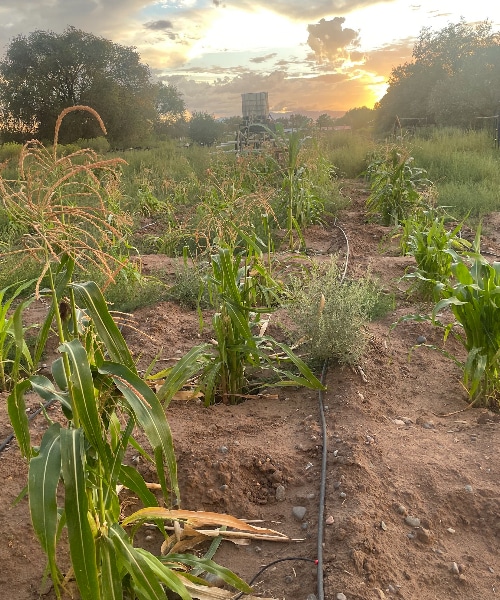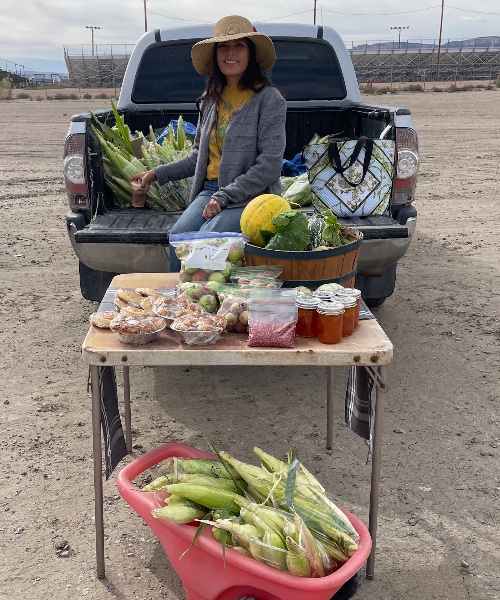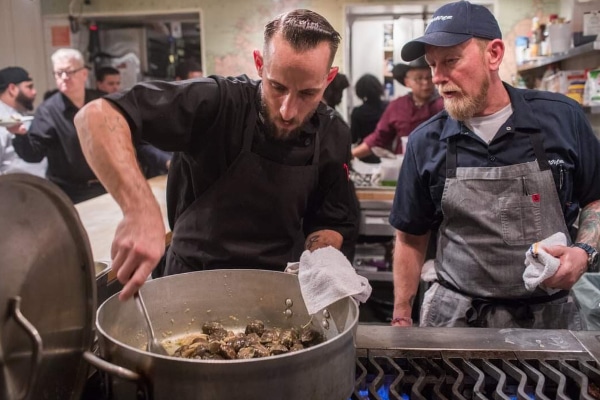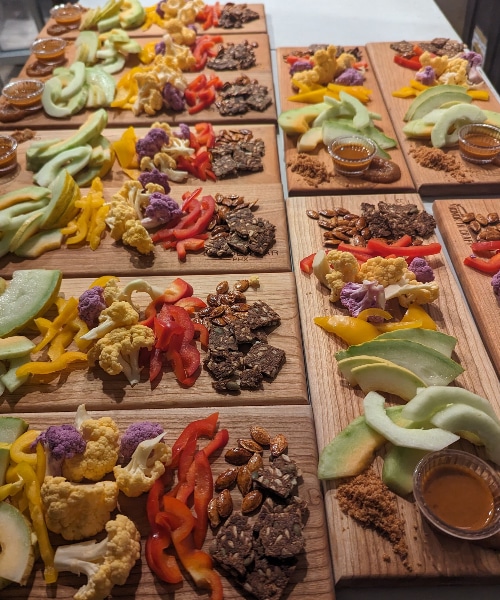BY PAM DELANY
On a crisp December morning under the open skies of the Navajo Nation, Danielle Goldtooth and Alan Moore, a wife-and-husband team, are helping their neighbors build a sheep corral. Like their venture, Dii ÌINA-Culinary, the day’s work reflects a deep commitment to community, tradition, and food sovereignty.
Dii ÌINA means “this life” in Diné, and the couple’s culinary concept imbues the holistic worldview of personal well-being, sustenance, community, and a reciprocal relationship with the land. Their work defies the boundaries of an ordinary business venture. Instead, it weaves together a tapestry of food system collaborations, private dinners and pop-ups, traditional farming and foraging, education, and mentorship. Global food cultures and traditions are blended in what the couple refers to as transcontinental food synthesis — a concept that imagines what might have been if colonization had centered on cultural exchange rather than conquest.
Alan explains, “We sat down and thought, what if, instead of conquering, they came over with the idea of trade, not just of goods but also of techniques and ideas?” Their company embodies the couple’s food philosophy, eroding culinary boundaries through a diverse community culture. One cherished collaboration was with Roy Kady, a Navajo- Churro sheep herder and rug weaver known for his commitment to cultural and agricultural heritage preservation. After returning from a trip to Italy, Roy asked Danielle and Alan to prepare a meal for a community event. Taking a transcontinental approach, they created steamed corn pasta with cacciatore sauce using Indigenous ingredients such as steamed corn and Churro sheep meat. The sheep meat represented the Italian dish, cacciatore, which uses what was hunted that day. Steamed corn is deeply significant to Navajo culture as a staple food representing resilience and sustenance. Danielle and Allen honored steamed corn’s significance to Navajo culture by grinding it to make pasta, thereby reimagining the international staple.
The couple brings diverse backgrounds and skills to Dii ÌINA-Culinary. Alan’s career as a chef was influenced by his uncle and aunt, who introduced him to the joys of food and hospitality. After serving in the Army and working at several restaurants, he attended a program designed to teach culinary skills at St. Mary’s Food Bank. He later learned butchery at a family-owned farm near Tucson. Danielle was raised on the Navajo Nation, where she honed her expertise in foraging. Her talents also shine in mixology. Danielle’s Smokin’ Bilasaana Hottie Toddy, crafted for Teramana Tequila’s holiday cocktail list, draws from annual trips with her grandmother to an unkept apple orchard in Colorado. “Alan smokes the apples for me and makes this amazing apple butter,” she says. “It’s one of our family traditions and something we wanted to share through the recipe on their website.”

Danielle and Alan’s journey together began in 2018 when their paths crossed in the bustling kitchen of the Breadfruit and Rum Bar in Phoenix, known for its sustainability and culinary innovation. Alan, a sous chef, and Danielle, a mixologist, quickly recognized their shared passion for food and community. “It just clicked,” Alan recalls. “It made the absolute sense that neither of us was able to ignore, really.”
They soon became a visionary couple, going on to work in catering and thriving in an industry that relies on gatherings and celebrations. When the world temporarily shut down in 2020, Danielle watched the grocery store shelves become empty. “As a mother and community member, I realized something was wrong with our food system,” Danielle reflected. “People were having a hard time trying to figure out where to buy beef, where to buy toilet paper,” she explained.

Recognizing that everything was tied to agricultural products, Danielle and Alan decided to get to the source of it, laying the foundation for what would eventually become Dii IINÀ-Culinary. The couple moved to the Navajo Nation in New Mexico, bringing them a renewed sense of purpose. Their goal was clear: to teach their children and community the entire food journey. “Our kids wanted to see these things, and we wanted them to experience where their food system started and where it comes from,” Danielle says.
They began working on Danielle’s grandparents’ farm, immersing themselves in the cycles of farming, harvesting, and sustainable living. On the four-acre property, a massive cottonwood tree and a second, smaller cottonwood stand together as a married pair, their branches forming an 800-square-foot canopy that welcomes the community and visitors to gather together. In addition to horses and mulberry trees, the farm also includes a research and development garden with a water feature in the center that runs on natural groundwater.

Danielle and Alan act as stewards of the Earth, whether foraging for wild ingredients or caring for the land. Their foraging trips are as much about caretaking as they are about gathering. They clean up trash, observe the health of the land, and even report invasive species to aid in the survival of native varieties. Their work involves partnerships with local farmers, ranchers, and producers. The couple emphasizes the importance of knowing where their ingredients come from, often sourcing directly from those who grow or raise them. “We don’t like putting food on a plate if we haven’t met the person who grew it,” Alan says.
The couple’s vision for Dii ÌINA-Culinary extends far into the future. They desire to open a restaurant in Arizona’s Verde Valley, a place they describe as magical for its beauty and agricultural history. The restaurant will showcase everything they’ve learned about food sovereignty and be a hub for community connections. In the meantime, they continue to partner with others to host private dinners and pop-ups at regional restaurants, and even take on educational speaking engagements from time to time.
Education and mentorship are also at the cornerstone of their mission. Recently, Alan taught a corn nixtamalization workshop at a Navajo Nation school. The pair honors the many mentors in their lives and works to find ways to bridge the gap between generations. “We’re preserving traditional knowledge and giving people the tools to engage with their food systems,” Danielle explains. “Our big picture vision is to become mentors ourselves someday, and right now we are researchers.”

As Dii ÌINA-Culinary continues to evolve, Danielle and Alan see opportunities to eliminate barriers so that people can reconnect to traditional food cultures, knowing that their work isn’t just about them but about the next generation and the one after that. Their work exemplifies the power of food to heal, connect, and sustain both communities and the planet.


